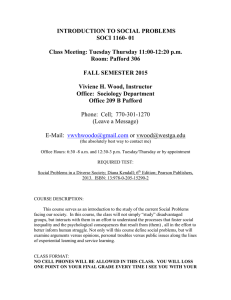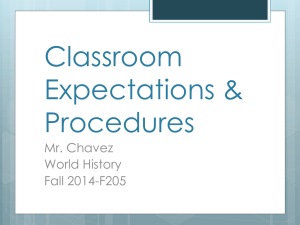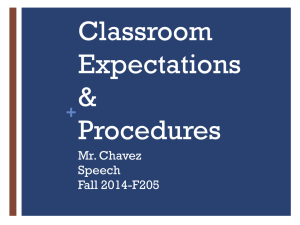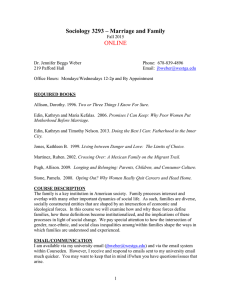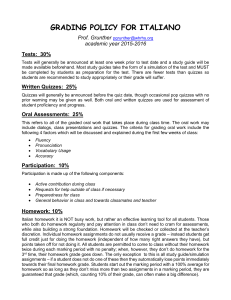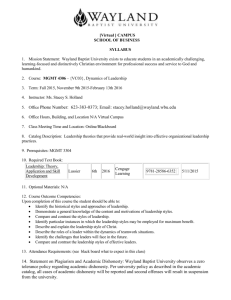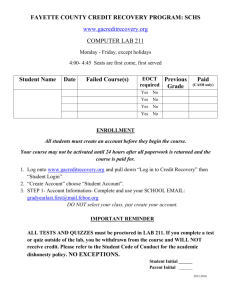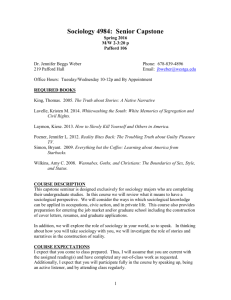SOCIAL PROBLEMS - The University of West Georgia
advertisement
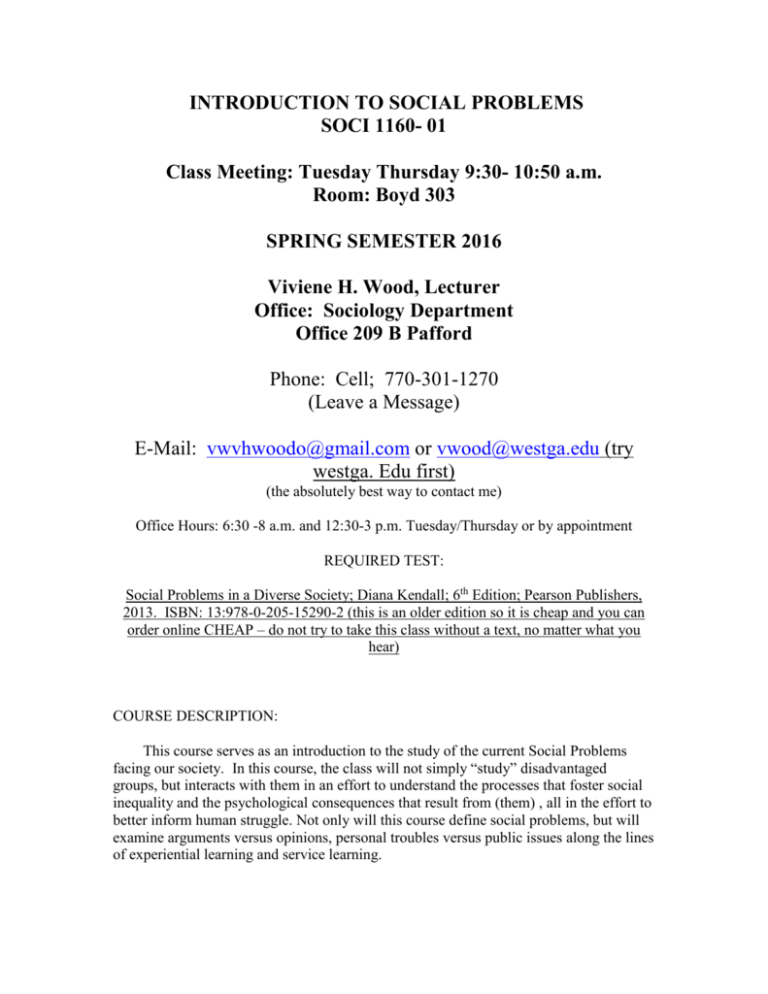
INTRODUCTION TO SOCIAL PROBLEMS SOCI 1160- 01 Class Meeting: Tuesday Thursday 9:30- 10:50 a.m. Room: Boyd 303 SPRING SEMESTER 2016 Viviene H. Wood, Lecturer Office: Sociology Department Office 209 B Pafford Phone: Cell; 770-301-1270 (Leave a Message) E-Mail: vwvhwoodo@gmail.com or vwood@westga.edu (try westga. Edu first) (the absolutely best way to contact me) Office Hours: 6:30 -8 a.m. and 12:30-3 p.m. Tuesday/Thursday or by appointment REQUIRED TEST: Social Problems in a Diverse Society; Diana Kendall; 6th Edition; Pearson Publishers, 2013. ISBN: 13:978-0-205-15290-2 (this is an older edition so it is cheap and you can order online CHEAP – do not try to take this class without a text, no matter what you hear) COURSE DESCRIPTION: This course serves as an introduction to the study of the current Social Problems facing our society. In this course, the class will not simply “study” disadvantaged groups, but interacts with them in an effort to understand the processes that foster social inequality and the psychological consequences that result from (them) , all in the effort to better inform human struggle. Not only will this course define social problems, but will examine arguments versus opinions, personal troubles versus public issues along the lines of experiential learning and service learning. CLASS FORMAT: NO CELL PHONES WILL BE ALLOWED IN THIS CLASS. YOU WILL LOSS ONE POINT ON YOUR FINAL GRADE EVERY TIME I SEE YOU WITH YOUR CELL PHONE IN USE. I WILL NOT NOTIFY YOU OF THIS – THE POINT WILL JUST BE DEDUCTED. Lecture-discussion formats the majority of this class. Class sessions include primarily lecture, with full-class and work-group discussions. Exercises and out-of –class assignments serve to enhance the learning experience. Not all lecture material and class discussion topics come from the text, therefore, attendance is mandated. LEARNING OBJECTIVES: - - The student will examine some of the social problems currently arising in our present society. Students will investigate how others have performed service learning assignments or become civically engaged with campus and community groups; worked with faculty conducting community-based research projects; worked with organizations using the tools of social science research to improve the living conditions of citizens. Students will scrutinize how they can best apply what others have done to address social problems to social problems they have observed. The student will identify specific, realistic steps for implementation of positive resolution. The courses-learning objectives are related to the following Introduction of Social Problems Learning Outcomes: 1. Students will be able to communicate (orally and in writing) how the current social problems facing our society operates describing both strengths and weaknesses of present day resolution options. 2. Students will be able to understand the roots of as well as the restraints of current social problems. 3. Students will be able to articulate present day social problem resolution process and detail their ability to apply this process 4. The student will be able to not only know some of the major social problems but how to positively address them and impact the living and working conditions of a specific society. COURSE REQUIREMENTS AND GRADING METHODS: Quizzes: There will be 4 quizzes over three/four chapters each. There will be a fifth grade of all homework. Your semester grade will be the average of these five grades. Quizzes will not be comprehensive. They will cover material from the lectures and readings of those previous weeks. Quizzes will cover material from the text AND material discussed in class (which may, but not exclusively, include newspaper articles, other appropriate publications, etc.). The quizzes are primarily for you, the student. Their purpose is to keep you on track and current. These four quizzes serve as your mid term and your final. THERE WILL BE NO MAKE UP FOR MISSED QUIZZES, WHATSOEVER, FOR ANY REASON. Do not ask. The fifth grade (homework) is the easiest grade. Complete your homework assignments and turn them in on the assigned dates and you can make an easy 100 (understand that “complete” is defined as thoroughly answering each assignment in professional format). Late work will have a 30 point (min.) reduction. Failure to complete the assignment will be a zero. Late work must be approved by me. Do not assume that I will agree to accept late work. Assignments that are incomplete, or below college level work will be graded accordingly. EACH assignment must be entered in CourseDen in the appropriate DropBox by the assigned date. ATTENDANCE: Attendance to class is imperative. Sign-in sheets will be utilized periodically and this may influence a higher letter grade if there is a question. DO NOT BE LATE FOR CLASS. ONCE THE DOOR IS CLOSED YOU ARE ABSENT. Grade adjustment must be requested within 7 days of the due date. Any grade after 14 days of due date stands as is WITHOUT ANY EXCEPTIONS. Keep up with your grades. Your final course grade will be based on the following distinctions: A= 90 to 100% B=80 to 89 % C= 70 to 79% D= 60 to 69% F =below 60 MAKE UP POLICY: Quizzes can not be made up. Missed quizzes will be recorded as zeros. Examinations can be made up only in exceptional circumstances. These will be considered on an individual basis and must be approved personally. These make up exams will be different from the original and will automatically mandate a 50% deduction from your final exam grade. Make sure you understand how to take quizzes on D2L – any problem with taking these quizzes in this fashion must be verified by D2L personnel. If you think your computer will break, loose power or somehow malfunction – go to a reliable source to take your quiz. POLICY ON ACADEMIC DISHONESTY: Any instances of plagiarism or cheating will result in an immediate “failure” for this class, with no questions asked. If your are unsure or unfamiliar with the term “plagiarism” look it up or ask for clarification. Course Outline: CourseDen Blackboarding contains each chapter’s readings and assignments will be discussed in class. Not all assignments will come through CourseDen, though. Class attendance is mandatory to receive notification and instructions regarding assignments. Do NOT rely on your classmates or email for this information. Make sure you know how to use CourseDen thoroughly. All of your grades generate from CourseDen. Each chapter will be updated throughout the semester. I will announce their comprehensiveness Americans with Disabilities Act Students with a documented disability may work with UWG Accessibility Services to receive essential services specific to their disability. All entitlements to accommodations are based on documentation and USG Board of Regents standards. If a student needs course adaptations or accommodations because of a disability or chronic illness, or if he/she needs to make special arrangements in case the building must be evacuated, the student should notify his/her instructor in writing and provide a copy of his/her Student Accommodations Report (SAR), which is available only from Accessibility Services. Faculty cannot offer accommodations without timely receipt of the SAR; further, no retroactive accommodations will be given. UWG Email Policy University of West Georgia students are provided a MyUWG e-mail account. The University considers this account to be an official means of communication between the University and the student. The purpose of the official use of the student e-mail account is to provide an effective means of communicating important university related information to UWG students in a timely manner. It is the student’s responsibility to check his or her email. Credit Hour Policy The University of West Georgia grants one semester hour of credit for work equivalent to a minimum of one hour (50 minutes) of in-class or other direct faculty instruction AND two hours of student work outside of class per week for approximately fifteen weeks. For each course, the course syllabus will document the amount of in-class (or other direct faculty instruction) and out-of-class work required to earn the credit hour(s) assigned to the course. Out-of-class work will include all forms of creditbearing activity, including but not limited to assignments, readings, observations, and musical practice. Where available, the university grants academic credit for students who verify via competency-based testing, that they have accomplished the learning outcomes associated with a course that would normally meet the requirements outlined above (e.g. AP credit, CLEP, and departmental exams). University of West Georgia Honor Code At the University of West Georgia, we believe that academic and personal integrity are based upon honesty, trust, fairness, respect, and responsibility. Students at West Georgia assume responsibility for upholding the honor code. West Georgia students pledge to refrain from engaging in acts that do not maintain academic and personal integrity. These include, but are not limited to, plagiarism, cheating, fabrication, aid of academic dishonesty, lying, bribery or threats, and stealing. The University of West Georgia maintains and monitors a confidential Academic Dishonesty Tracking System. This database collects and reports patterns of repeated student violations across all the Colleges, the Ingram Library, and the School of Nursing. Each incidence of academic dishonesty is subject 2 to review and consideration by the instructor, and is subject to a range of academic penalties including, but not limited to, failing the assignment and/or failing the course. Student conduct sanctions range from verbal warning to suspension or expulsion depending on the magnitude of the offense and/or number of offenses. The incident becomes part of the student’s conduct record at UWG. Additionally, the student is responsible for safeguarding his/her computer account. The student’s account and network connection are for his/her individual use. A computer account is to be used only by the person to whom it has been issued. The student is responsible for all actions originating through his/her account or network connection. Students must not impersonate others or misrepresent or conceal their identities in electronic messages and actions. CONCERNS: Cell phones and lap tops are banned from use in all of my classes unless personally and specifically approved. Violation is this will result in expulsion from class. Bottom line: Don’t try it. Don’t have any electronic device on in class without my approval. TENATIVE COURSE SCHEDULE : Week of class: chapter in text and assignment: January 11 Syllabus review; chapter 1 January 18 Chapter 2 January 25 Chapter 3 February 1 Chapter 4 February 8 Chapter Quiz over chapters 1-4; Chapter 5 February 15 Chapter 6 February 22 Chapter 7 February 29 Chapter 8 March 7 Chapter 9 and Chapter quiz over chapters 5-8; March 21 chapter 10 March 28 Chapter 11 April 4 Chapter 12 April 11 Chapter 13 with Chapter Quiz over chapters 9-12 April 18 Chapter 14,15,18 Final quiz over chapters 13-18 will be on the scheduled final exam date for this class during the week of April 25
